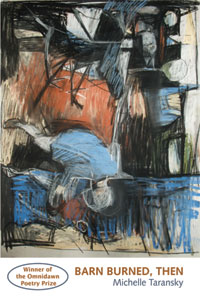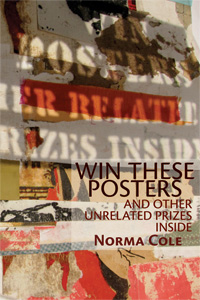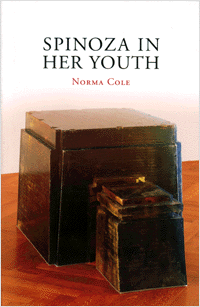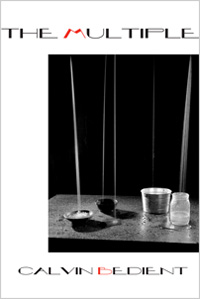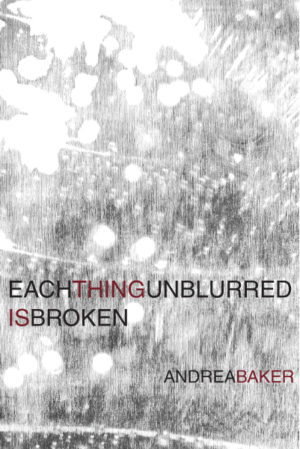Description
Winner of the 2008 Omnidawn 1st/2nd Poetry Book Prize
Marjorie Welish, the esteemed poet who selected Michelle Taransky’s manuscript for the Omnidawn prize, explains that these poems “animate the economies and concerns of our lives. Barn Burned, Then implicates Objectivism in this imagining, to create poems of the conglomerate of bank and barn—words shown to be made of contingent cultural forces.” In terse, tautly crafted poems that are dynamically contemporary, Taranksy assesses our cultural moment with unrelenting courage and candor.
Imagine this: sentences broken into phrases at fault lines of testimony, where the words “barn” and “bank” animate the economies and concerns of our lives. Barn Burned, Then implicates Objectivism in this imagining, to create poems of the conglomerate of bank and barn—words shown to be made of contingent cultural forces.
From “Building the Bank, Asking”:
Who called the bank
The bank of
Grave the bank
You asked for praying
Mantis
When she handed us the bill her hands were
Hands of a farmhand.
It’s good to have the image in mind
At the bank
Farmed stoppagesBy chance—that is to say, by the happenstance that changes lives irrevocably—are these poems wrought. (What legitimizes happenstance remains in the background.) With Barn Burned, Then Michelle Taransky becomes the worthy winner of Omnidawn’s initial publication of emerging talent.
Marjorie Welish, Judge of the 2008 Omnidawn 1st/2nd Poetry Book Prize
Michelle Taransky’s Barn Burned, Then explores the hidden economies of a derelict American dream. In this ingeniously unified and mercilessly fractured collection of poems, the barn and the bank—those fundamental repositories of value—become sites for an elegiac meditation on signification itself. What is a barn? “A windowless address / put up to the shadow-maker.” What is a bank? “A way to get more for less.” With uncanny foresight, this postmodern Cassandra’s lyrical utterance warn us about the Ponzi scheme of modernity, while simultaneously “taking care // Of our ailing want / To piece back together // All that has parted.”
Srikanth Reddy
Michelle Taransky takes her title from Masahide’s 17th century haiku: “Barn’s burnt down – / now / I can see the moon.” There, physical loss is a gateway to an ecstatic gain of focus. Here, barns still burn, but the haze that hovers over the disappeared structures is more fiscal than physical: banks, not lightning or arson, would seem to be the (in)efficient causes. In two interlocked series, “Burn Book” and “Bank Book,” Taransky uses her fluency in frame-scanning, collage, and abstraction to alert readers to the depth of tinder we live amid.
Bob Perelman
About the Author
Reviews
Excerpt
Michelle Taransky received a BA from the University of Chicago and an MFA from the Iowa Writers’ Workshop. With her father, architect Richard Taransky, she is the coauthor of The Plans Caution (QUEUE 2007). Her poems have appeared in publications including Denver Quarterly, VOLT, How2 and New American Writing. She currently lives in Philadelphia, where she works at Kelly Writers House and teaches poetry at Temple University.
Taransky reinvigorates the tradition of the American avant-garde with this fragmentary and ingenious celebration of immanence, immediacy, and materiality over transcendence, literality, and sentimental reductivism. Barn Burned, Then isn’t, by any means, an easy read; nevertheless, one can’t fully understand the metaphysical contours of human speech and emotion without reading a superlative work like this one, so gird yourself for the challenge and dive courageously into the fire.
Michelle Taransky’s poems … are massive (or super) machines made of words. Q.v. how even the most winn(ow)ing poem … in her Omnidawn Poetry Prize-winning (and now Offending Adam Book of the Month) BARN BURNED, THEN is a window into the workings of the book (=factory of excitement) at large.
Taransky’s work places us immediately and fully into the space created by loss and its aftermath: lines are spare and usually quite short, images are as bare and fragile as the half-burnt rafters of the half-present barn, and throughout the book a certain repertory of words—drawn from both financial and agricultural registers—repeats and recurs, as if the repository of language itself had, along with its storehouse, gone up in smoke.
Michelle Taransky’s award-winning poetry collection asks of its reader, “can our digging / Do the job” —most notably of itself. Separated into “Burn” and “Bank” books, the poems of each arrangement explore division and how postmodern meaning may be derived from their fractured structuring. Yet, if “this farm is / Our craft” and “only stories grow tall,” what becomes of contemporary understanding when “a boundary stone is moving” and the barn is razed? Barn Burned, Then offers no easy answers, but much in the manner that the work’s sense of potentiality smolders, this Omnidawn Poetry Prize winner is aglow in embers, emitting—even when marked in numbers instead of words—a smoky significance.
Taransky’s project is fascinating, for she has written two long poems broken into individual pieces that seem to be commentaries on each other and which comment on society. In “Bank Book” the poems point to banks being under our current capitalist system but at the same time show them as being falsely under us. She doesn’t do this in a theoretical way or as leftist propaganda; rather, she puts the poems into voices that speak to us/whisper to us on the way out of a burning building.
Barn Burned, Then
The bank,
A teller,
The same figures’
Capacity to chorus, as if
Light was beaten for bread
A confessed wage
Through another
Chance-flood
Broken-necked flicker
Gold pawed labyrinth
Flints of past thresher
Taking brother who is best
At hiding
Writing a statement
To take the barn’s place

